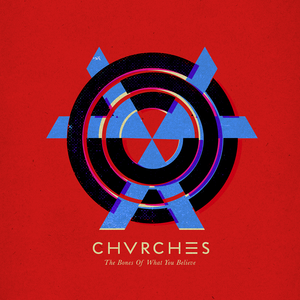(original published on Music Meet Fans)
An irresistible song called “Lies” by a Scottish band named Chvrches appeared on the internet one day in May 2012, as if conjured from the ether. Vacillating waves of synth and playful electronic effects supporting an anonymous female vocalist. Released on the Neon Gold website and accompanied only by a picture of nuns in masks, “Lies” rocketed to number one on the MP3 aggregate blog The Hype Machine and received a tremendous amount of organic, blog-based buzz after regular airplay on SoundCloud and BBC Radio 1. “Lies,” alongside “The Mother We Share,” “Gun,” and “Recover,” fueled the immense pre-release anticipation for the band’s debut full-length The Bones of What You Believe.
“There was this democracy on SoundCloud at the time… where you could use it as a very pure form of marketing. It was about whether people were interested in what you had to say musically, and nothing else,” Martin Doherty said about the early days recording and releasing the first Chvrches songs that would comprise the bulk of their debut record.
Strong Hand
The album’s title derives from a lyric in “Strong Hand,” a song that was ultimately cut from the original track list only to be reinstated on the 2014 Special Edition release. According to frontwoman Lauren Mayberry, the lyric refers to the raw “creativity and effort” that fueled the months of sweat and preparation leading up to the album’s release.
Chvrches, the trio of Doherty, Mayberry and Iain Cook, became a viral juggernaut because they made instantly accessible electronic music, but they attained indie omnipresence because that accessible electronic music also contained a human pulse and lyrics that transcended the escapist natter of contemporary, manufactured pop music.
Some of that crossover appeal might be explained by their outsider status. None of these artists had ever produced music that sounded like this in any of their other projects. They had all cut their teeth working with guitars and angst, traditional tools of the indie-rock trade. Doherty’s longest-tenured job came as a member of post-punk Scottish shoegazers The Twlight Sad, a band best known for their dense, “ear-splitting” live performances. Mayberry still looks to Nirvana for inspiration. Attend a Chvrches show and you’ll see glimmers of those origins more readily than in their polished studio recordings.
“It might be difficult to tell,” Cook said in an interview with The Scotsman, “but I think there are still elements of what we’ve done before in the music we’re making now. But the arrangements and the instrumentation, and the focus on catchy melodies and stuff, I guess that’s new for us.”
The Mother We Share
In an era where buzz for synth-pop bands expands and bursts in the time it takes to blow an unimpressive bubble, Chvrches’ spire stands taller because they backed those “catchy” melodies and immaculate hooks with explosive catharsis. Iain Cook’s finely tuned production on The Bones of What You Believe hasn’t strangled the album of individualism; rather, he’s given each song a chance to breathe, creating a rollercoaster of processed effects and synth-pad cadences, thereby emulating the ebb and flow of human emotion.
“And when it all fucks up, you put your head in my hands / It’s a souvenir for when you go-o-o-oh,” Mayberry sings on “The Mother We Share,” the album’s deceptively nuanced opening volley, a song that might have been classified as a disposable confection if not for her willingness to embrace fragility. She calls attention to a darker side of euphoria – the pain of consciously and irreparably discarding an essential part of your whole. This naturalistic alliance between levity and despair runs throughout The Bones of What You Believe. Cook and Doherty’s pulsing and atmospheric throwback musicality balanced by Mayberry’s grounded sincerity. Cook even shouted out 1980’s horror movie scores – Charles’ Bernstein’s The Nightmare on Elm Street in particular – as a primary source of inspiration.
We Sink
At the height of her powers on a peppy but vengeful track like “We Sink,” Lauren Mayberry possesses a relatable range that empowers her simple, emotive lyrics. In the ideal soundscape, her shortcomings as a songwriter attain potency beyond the burnished letters on the page. Depeche Mode’s primary wordsmith Martin Gore, who once called happy songs “fake and unrealistic,” serves as a direct antecedent.
Having opened for Depeche Mode early in their career, Chvrches serves as an extension of that same dual-minded ambition: anthemic and orchestral electronic music. And even though you might occasionally mistake catchy for “happy” on The Bones of What You Believe, Gore likely approves of the album’s scarcity of bliss. Mayberry has even credited Depeche Mode frontman Dave Gahan for teaching her how to command a stage – something she struggled with early on, as her initial presence failed to rival the self-assurance of Chvrches’ recordings.
On “Gun,” “Recover” and “By the Throat” the band displays an outsized confidence in pacing and patience. This ability to dial back the cacophony before reaching a swelling dénouement would become more apparent on tracks found on their later records such as “Clearest Blue.” Here, however, the results feel less deliberate – each successive element inspired by the urgency of the individual moment.
Tether
The greatest example of this occurs on the lesser celebrated “Tether,” a song about emerging scarred but unbroken from a destructive relationship. It begins with a repetitive, understated guitar riff backing Mayberry’s lyrics.
“Trade our places / take no chances / bind me ‘til my lips are silent” she sings as the song’s urgency increases. Just beyond the two-minute mark, when you expect the individual components to unify, the bottom falls out for thirty seconds, leaving little more than a static hum. “I feel incapable of / Seeing the end / I feel incapable of / Saying it’s over,” she repeats. Synth and drum machine ascend and merge into one. The guitar returns, creating narrative agency and releasing the burden of hopelessness. It’s a moment perfected in the best work by a complex sonic craftsman like M83 – hardly territory covered in a self-produced debut record.
While Chvrches has often been hailed as a band made by blogger hype, the description often suggests condescension, as if success fell into their lap. All three members paid industry dues before their instant chemistry forged a creative partnership that’s proven that they’re more than just another ephemeral synth-pop sensation. Bands toil throughout their entire careers to produce one song as resonant as the twelve on The Bones of What You Believe. It takes a lot of work to be that lucky. Chvrches may not have blazed new trails, but they resuscitated the beautiful, soulful heartbeat within electronic music. That singular sound, an assemblage of discarded elements, breathed new life into an increasingly droll independent landscape.

